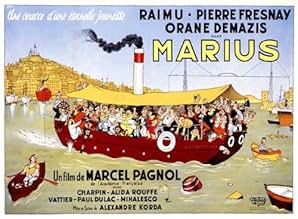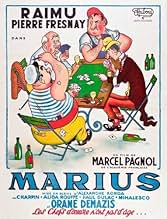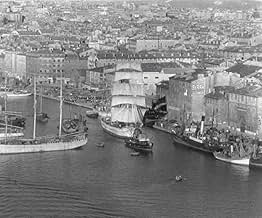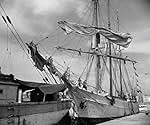Marius
- 1931
- Tous publics
- 2h 10m
IMDb RATING
7.8/10
2.7K
YOUR RATING
Marius is faced with a choice whether to fulfill his passion by sailing the seas or stay and marry the woman he loves.Marius is faced with a choice whether to fulfill his passion by sailing the seas or stay and marry the woman he loves.Marius is faced with a choice whether to fulfill his passion by sailing the seas or stay and marry the woman he loves.
Fernand Charpin
- Honoré Panisse
- (as Charpin)
Alexandre Mihalesco
- Piquoiseau
- (as Mihalesco)
Lucien Callamand
- Le quartier-maître du ferry-boat
- (uncredited)
Zé Digiovanni
- Innocent Mangiapan
- (uncredited)
Milly Mathis
- Tante Claudine Foulon
- (uncredited)
Valentine Ribe
- Un client
- (uncredited)
- …
Featured reviews
Although a film in subtitles, it easily translates into any language through the universal language of the heart. Pagnol was a strong believer that even though sound was a new and amazing convention in cinematography, it could not be taken advantage of. This belief is readily apparent in Marius. Marius is filled with wonderful dialogue, heartwarming scenes, and emotional relationships. Furthermore, the characters of Cesar and Marius were played to perfection. This film is one that breaks the barrier of time. Even though it may be seventy years old, its themes will universally touch all of those who watch it for ages and generation
This movie is extremely similar to the first half or so of the movie Fanny (1961) and in many places it is almost word-for-word. All in all it is an exceptional movie and well worth watching.
Fanny (1962) is a remake that combines this movie and the two sequels, Fanny and César. All are great, though the cinematography and music make the remake a better picture (the trilogy had no music).
Overall, it was extremely well-acted and well-written and I strongly recommend it. However, be forewarned that the videotape by Interama Video Classics is VERY poor quality AND they use white subtitles that are often very hard to read. I don't know why, but nearly EVERY French film from the 1930s I have tried to watch on video is almost unwatchable due to the degradation of the print. I'm not sure why this is, but it could easily turn people away from classics like this movie, and that would be quite a loss.
Fanny (1962) is a remake that combines this movie and the two sequels, Fanny and César. All are great, though the cinematography and music make the remake a better picture (the trilogy had no music).
Overall, it was extremely well-acted and well-written and I strongly recommend it. However, be forewarned that the videotape by Interama Video Classics is VERY poor quality AND they use white subtitles that are often very hard to read. I don't know why, but nearly EVERY French film from the 1930s I have tried to watch on video is almost unwatchable due to the degradation of the print. I'm not sure why this is, but it could easily turn people away from classics like this movie, and that would be quite a loss.
Idyllic piece from the childhood of the cinema of sound and music, when films actually mainly were just screened theatre, and as such this film is an outstanding example. Marcel Pagnol's script is actually a play, and the players here make more than the best of it - they are all virtuoso performances. The dialog is not very witty, there is nothing special to it, and neither is the cinematography, which hardly had had time to get born yet in the sound films, but wich was on its way. So the assets here are mainly just the acting, and the environment coulndn't be more picturesque - the harbour of old Marseilles with its shabby joints, bars and cafès, and they drink a lot throughout the film. The question is, will Marius marry the girl he actually loves, or will he go to sea for the adventure he loves and longs for? It is not settled until in the very last moment, while Fanny and his father César both love him the more for whatever he chooses to do. - To be continued.
This is a classic movie. I watched this one 10 times. Lots of humor, it represents France in the 30's in Marseille. What is interesting are the dialogues and cast of characters. One of the best movies of Pagnol and an excellent role for Raimu.
1931 was quite a year for movies, while the talkies started in the late 20's with "The Jazz Singer", it's only in 1931 that directors found better than fluffy Broadway comedies to reach the audiences and made the first classic talking pictures, from seminal gangster movies "Little Caesar" and "The Public Enemy" to horror landmarks "Dracula" and "Frankenstein", each films providing iconic moments and, for the first time, immortal quotes establishing in the most complete way the different aspects of cinema's appeal: characters, visuals, special effects but also an art-form of the verb. Edward G. Robinson would be one of the first voices with a specific intonation and accent and inevitably, the first to ever be parodied and remembered, see?
And in France, it's only fair that one of the first voices to ever "grace" the screen (so to speak) and to also be imitated would have the singing intonation of that French Provence accent, the Mediterranean South with that "Little Italy" touch, where people display a temperament of histrionic bad faith but ultimately pride and a heart, as big as forty 'Cannebières' all contained in the magnificent baritone voice of Jules Muraire aka Raimu aka César, the bartender of Marseilles. It is very interesting that the film is most remembered for the scene where he plays a French version of pinochle with his friends and to lure his teammate Captain Felix Escaterfigue (Paul Dullac) to play the "heart", he keeps repeating "you break my heart" and it only gets hilarious because Felix can't figure what he means until it becomes apparent for everyone but him. And in the most childish way, César acts offended when he's finally accused by Panisse (Honoré Chapin) who wasn't the brightest bulb either.
That's what Alexandre Korda's "Marius" is about actually: heart and playing, or cheating, French viewers remember "You're breaking my heart" and repeat it with the same accent as one would quote Arnie with Austrian robotic tone, but it takes the viewing of "Marius" to see how emblematic to the story this scene is: the film is about people in love, it's a romance, a love triangle between three characters who know as much about love as they know about themselves, and that's exactly what either drives or undermines their momentum. Young César's son Marius (Pierre Fresnay) is in love with little seashell merchant Fanny (Orane Demazis) and daughter of fish store owner Honorine (Alida Rouffe) but after years of wandering in Marseilles' streets and watching ships sailing to the seven seas, the call of the sea got louder and louder.
And there's Panisse who's a widower in his fifties and can only offer his money, he's respectful enough to Fanny that he takes his time to court her, makes no lies about his intention and even approaches her mother Honorine; in the process, he also makes a rival out of young impetuous Marius. Fanny is torn between a young man she loves but conveniently never admitted her love and one proposing a marriage of convenience. And in the middle of this conflict, César is the (not so) passive observer, acting more like a Greek chorus to a tragicomedy full of such larger-than-life characters that even this two-hour movie couldn't sustain it. That's the power of Pagnol's characters, they didn't wait for the film to be fully developed, the film didn't need any exposition, the characters are here, and when the movie ends, we're looking forward to the sequel "Fanny".
A few people can create a world that feels realer than the real world, and with a slice of Provence's life, Pagnol made a real "Human Comedy" à la Balzac that would forever enchant French culture and lead to the two-parters "Jean de Florette / Manon of the Spring" and "My Father's Glory / My Mother's Castle". But let's get back to the one that started them all: there's a lot to say about "Marius", it provides the first sound to ever reach the hearts and screens of people, the visual quality gets blurry at time, but this is a movie as complete and professional as any creation and with a little screeching sound that almost resonates like the grasshoppers of the countryside. "Marius" carried the word 'iconic' because of the accent, the landscape but more than anything, the performance of Raimu whom Orson Welles called the "greatest actor alive", and seriously, I've rarely seen such natural and modern performances in an "old" movie.
It takes you to know French or have subtitles to appreciate the film but even without understanding a word, you can see how authentic everything is. The film is adapted from a successful play, but it doesn't feel theatrical at all unless you consider theatrical the tantrums of these Mediterranean fellows. Indeed, it brings France to the talkies' era without needing a genre: no horror, no gangster, just a simple but high drama about life and decisions to take. The climax is the culmination of such torments. We are used to see people who must make a choice between heart and reason, but for the first time, we also have the choice of instinct, and the center of the choice is "Marius" who must think of his love for Fanny, her reputation and his all-time dreams. The conflict is so tense that we can even feel the smell of the sea.
Right again, a very specific story with very specific characters but one of universal implications like Marcel Pagnol knows how to craft, and how fitting that the man born the same year than Cinema would contribute to the film that marked the birth of French Cinema. Of course, I mean modern cinema because Cinema was born French already and the first film was the famous train arriving at La Ciotat not far from Pagnol's hometown Aubagne or from Marseilles, the setting (and heart) of the Provence trilogy.
And in France, it's only fair that one of the first voices to ever "grace" the screen (so to speak) and to also be imitated would have the singing intonation of that French Provence accent, the Mediterranean South with that "Little Italy" touch, where people display a temperament of histrionic bad faith but ultimately pride and a heart, as big as forty 'Cannebières' all contained in the magnificent baritone voice of Jules Muraire aka Raimu aka César, the bartender of Marseilles. It is very interesting that the film is most remembered for the scene where he plays a French version of pinochle with his friends and to lure his teammate Captain Felix Escaterfigue (Paul Dullac) to play the "heart", he keeps repeating "you break my heart" and it only gets hilarious because Felix can't figure what he means until it becomes apparent for everyone but him. And in the most childish way, César acts offended when he's finally accused by Panisse (Honoré Chapin) who wasn't the brightest bulb either.
That's what Alexandre Korda's "Marius" is about actually: heart and playing, or cheating, French viewers remember "You're breaking my heart" and repeat it with the same accent as one would quote Arnie with Austrian robotic tone, but it takes the viewing of "Marius" to see how emblematic to the story this scene is: the film is about people in love, it's a romance, a love triangle between three characters who know as much about love as they know about themselves, and that's exactly what either drives or undermines their momentum. Young César's son Marius (Pierre Fresnay) is in love with little seashell merchant Fanny (Orane Demazis) and daughter of fish store owner Honorine (Alida Rouffe) but after years of wandering in Marseilles' streets and watching ships sailing to the seven seas, the call of the sea got louder and louder.
And there's Panisse who's a widower in his fifties and can only offer his money, he's respectful enough to Fanny that he takes his time to court her, makes no lies about his intention and even approaches her mother Honorine; in the process, he also makes a rival out of young impetuous Marius. Fanny is torn between a young man she loves but conveniently never admitted her love and one proposing a marriage of convenience. And in the middle of this conflict, César is the (not so) passive observer, acting more like a Greek chorus to a tragicomedy full of such larger-than-life characters that even this two-hour movie couldn't sustain it. That's the power of Pagnol's characters, they didn't wait for the film to be fully developed, the film didn't need any exposition, the characters are here, and when the movie ends, we're looking forward to the sequel "Fanny".
A few people can create a world that feels realer than the real world, and with a slice of Provence's life, Pagnol made a real "Human Comedy" à la Balzac that would forever enchant French culture and lead to the two-parters "Jean de Florette / Manon of the Spring" and "My Father's Glory / My Mother's Castle". But let's get back to the one that started them all: there's a lot to say about "Marius", it provides the first sound to ever reach the hearts and screens of people, the visual quality gets blurry at time, but this is a movie as complete and professional as any creation and with a little screeching sound that almost resonates like the grasshoppers of the countryside. "Marius" carried the word 'iconic' because of the accent, the landscape but more than anything, the performance of Raimu whom Orson Welles called the "greatest actor alive", and seriously, I've rarely seen such natural and modern performances in an "old" movie.
It takes you to know French or have subtitles to appreciate the film but even without understanding a word, you can see how authentic everything is. The film is adapted from a successful play, but it doesn't feel theatrical at all unless you consider theatrical the tantrums of these Mediterranean fellows. Indeed, it brings France to the talkies' era without needing a genre: no horror, no gangster, just a simple but high drama about life and decisions to take. The climax is the culmination of such torments. We are used to see people who must make a choice between heart and reason, but for the first time, we also have the choice of instinct, and the center of the choice is "Marius" who must think of his love for Fanny, her reputation and his all-time dreams. The conflict is so tense that we can even feel the smell of the sea.
Right again, a very specific story with very specific characters but one of universal implications like Marcel Pagnol knows how to craft, and how fitting that the man born the same year than Cinema would contribute to the film that marked the birth of French Cinema. Of course, I mean modern cinema because Cinema was born French already and the first film was the famous train arriving at La Ciotat not far from Pagnol's hometown Aubagne or from Marseilles, the setting (and heart) of the Provence trilogy.
Did you know
- Trivia"Asterix and the Banquet", the fifth volume in the popular French "Asterix" comic book series, visually references the film by having a tavern resemble the one in the film and populating it with characters based on those played by Raimu, Fernand Charpin, Paul Dullac, and Robert Vattier.
- Goofs(at around 11 mins) Honorine (Alida Rouffe) is talking with César. She puts her glass on the table, but after a cut, she puts the same glass again on the table.
- Quotes
César Olivier: I was 32 when my rump felt my father's boot for the last time. We knew what love and respect were in those days.
Marius: With a boot up your rear.
César Olivier: And we didn't answer back.
- ConnectionsAlternate-language version of Längtan till havet (1931)
- How long is Marius?Powered by Alexa
Details
Box office
- Gross US & Canada
- $8,262
- Opening weekend US & Canada
- $7,720
- Jan 8, 2017
- Gross worldwide
- $8,262
- Runtime2 hours 10 minutes
- Color
- Aspect ratio
- 1.20 : 1
Contribute to this page
Suggest an edit or add missing content
































